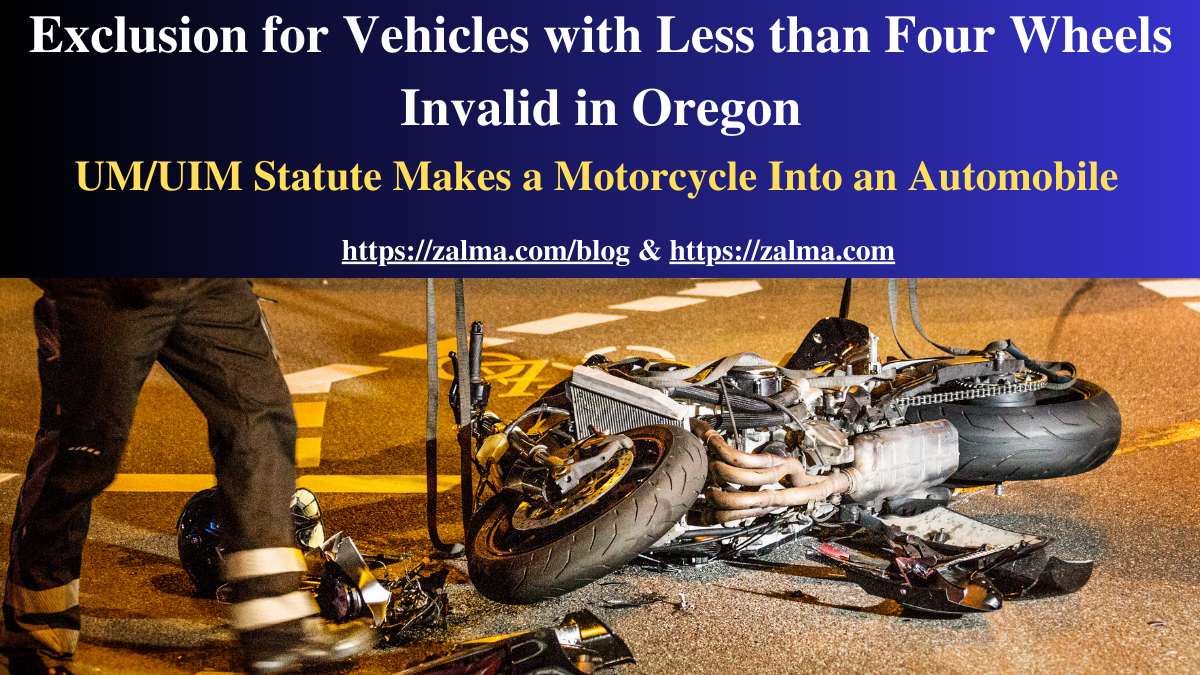-
News Feed
- EXPLORE
-
Pages
-
Groups
-
Events
-
Blogs
-
Marketplace
-
Offers
-
Jobs
-
Developers
Exclusion for Vehicles with Less than 4 Wheels Violates UM Statute

Exclusion for Vehicles with Less than Four Wheels Invalid in Oregon
Read the full article at https://lnkd.in/gqTGaRKp and see the full video at https://lnkd.in/gcSnQu5Q and at https://lnkd.in/ggF8SVfi and at https://zalma.com/blog plus more than 4450 posts.
UM/UIM Statute Makes a Motorcycle Into an Automobile
Progressive Classic Insurance Company contested the trial court’s entry of summary judgment in favor of plaintiff. The sole question to the Court of Appeals was whether the insurer was required by statute to provide coverage for “newly acquired vehicles,” such as plaintiffs motorcycle, notwithstanding an insurance policy term that excluded transportation devices with less than four wheels. The trial court granted plaintiffs motion and denied defendant’s motion.
In Steven Cantu v. Progressive Classic Insurance Company, 325 Or.App. 184, A175784, Court of Appeals of Oregon (April 5, 2023) the Court interpreted Oregon’s UM/UIM statute.
FACTS
Plaintiff was insured by defendant for three automobiles. The policy at issue did not list any motorcycles on the declaration page. About eight days after purchasing a motorcycle, plaintiff was severely injured when another driver negligently made a left turn in front of plaintiff.
As a result of the injuries, plaintiff sought damages in excess of the liability limits of the other driver. Defendant denied underinsured motorist bodily injury benefits based on specific terms of the insurance policy that excluded vehicles with less than four wheels.
The trial court granted summary judgment to plaintiff, after concluding that the relevant definitions in the insurance policy impermissibly provided underinsured motorist benefits that are less favorable to the insured than the terms of ORS 742.504 required.
A motorcycle, under a common understanding of the term, is a “device” “upon or by which any person” “may be transported *** upon a public highway” and is not “moved by human power” or “used exclusively upon stationary rails or tracks.” A motorcycle is therefore a vehicle within the definition provided by the legislature.
Defendant contended that the trial court erred by construing the statute as requiring the newly acquired vehicle provision to include the motorcycle when the policy itself did not cover any motorcycles.
There is no evidence that suggests that the legislature intended a different meaning for the word “vehicle” when defining “insured vehicle” than it did when defining “hit-and-run vehicle,” “phantom vehicle,” “stolen vehicle,” or “uninsured vehicle.”
The Court of Appeals concluded that it was apparent that the legislature intended the term “vehicle” to carry the definition the legislature provided in paragraph (m) and that the trial court did not err by concluding that the paragraph (m) definition of vehicle was the applicable definition of that word and it included motorcycles.
The court inferred that the motorcycle did not have “at least four wheels,” and was therefore excluded as a “covered auto” under the terms of the policy. A UM policy provides “less favorable” terms to an insured not by a direct comparison between the challenged provision with an individual statutory provision, rather, the coverages provided in the policy against those required by statute.
Thus, the court concluded that, by limiting the definition of “auto” in the policy to devices having “at least four wheels,” defendant impermissibly provided less favorable coverage to plaintiff than that required by law. The trial court did not err by concluding, or by granting summary judgment to plaintiff on that basis.
ZALMA OPINION
Legislatures have an amazing ability to deprive an insurer and insured of the ability to agree to the terms and conditions of the policy contract. Here, the plaintiff and his insurer agreed that it would not insure motorcycles. The plaintiff knew this when he bought his motorcycle. He got the court to provide coverage different than that agreed to in the policy by interpreting the UM/UIM statute to make a motorcycle an auto by the definitions in the statute because Progressive provided a policy wording – approved by the Department of Insurance – that provided coverage for the operation of the motorcycle. Of course, if the accident was plaintiff’s fault he would have had no liability coverage.
(c) 2023 Barry Zalma & ClaimSchool, Inc.
Subscribe and receive videos limited to subscribers of Excellence in Claims Handling at locals.com https://zalmaoninsurance.locals.com/subscribe.
Consider subscribing to my publications at substack at https://barryzalma.substack.com/publish/post/107007808
Barry Zalma, Esq., CFE, now limits his practice to service as an insurance consultant specializing in insurance coverage, insurance claims handling, insurance bad faith and insurance fraud almost equally for insurers and policyholders. He practiced law in California for more than 44 years as an insurance coverage and claims handling lawyer and more than 54 years in the insurance business. He is available at http://www.zalma.com and [email protected]
Follow me on LinkedIn: www.linkedin.com/comm/mynetwork/discovery-see-all?usecase=PEOPLE_FOLLOWS&followMember=barry-zalma-esq-cfe-a6b5257
Write to Mr. Zalma at [email protected]; http://www.zalma.com; http://zalma.com/blog; daily articles are published at https://zalma.substack.com. Go to the podcast Zalma On Insurance at https://anchor.fm/barry-zalma; Follow Mr. Zalma on Twitter at https://twitter.com/bzalma; Go to Barry Zalma videos at Rumble.com at https://rumble.com/c/c-262921; Go to Barry Zalma on YouTube- https://www.youtube.com/channel/UCysiZklEtxZsSF9DfC0Expg; https://creators.newsbreak.com/home/content/post; Go to the Insurance Claims Library – https://zalma.com/blog/insurance-claims-library.
Go to locals.com https://lnkd.in/gfFKUaTf.
Barry Zalma, Esq., CFE is available at http://www.zalma.com and [email protected]
Go to the Insurance Claims Library – https://lnkd.in/gWVSBde.

We are 100% funded for October.
Thanks to everyone who helped out. 🥰
Xephula monthly operating expenses for 2024 - Server: $143/month - Backup Software: $6/month - Object Storage: $6/month - SMTP Service: $10/month - Stripe Processing Fees: ~$10/month - Total: $175/month
- Art
- Causes
- Crafts
- Crime
- Dance
- Drinks
- Film
- Finance
- Fitness
- Food
- Games
- Gardening
- Health
- Home
- Literature
- Music
- Networking
- Paranormal
- Other
- Politics
- History
- News
- Party
- Science
- Religion
- Shopping
- Sports
- SyFy
- Politically Incorrect
- Philosophy
- Theater
- Technology
- Wellness



